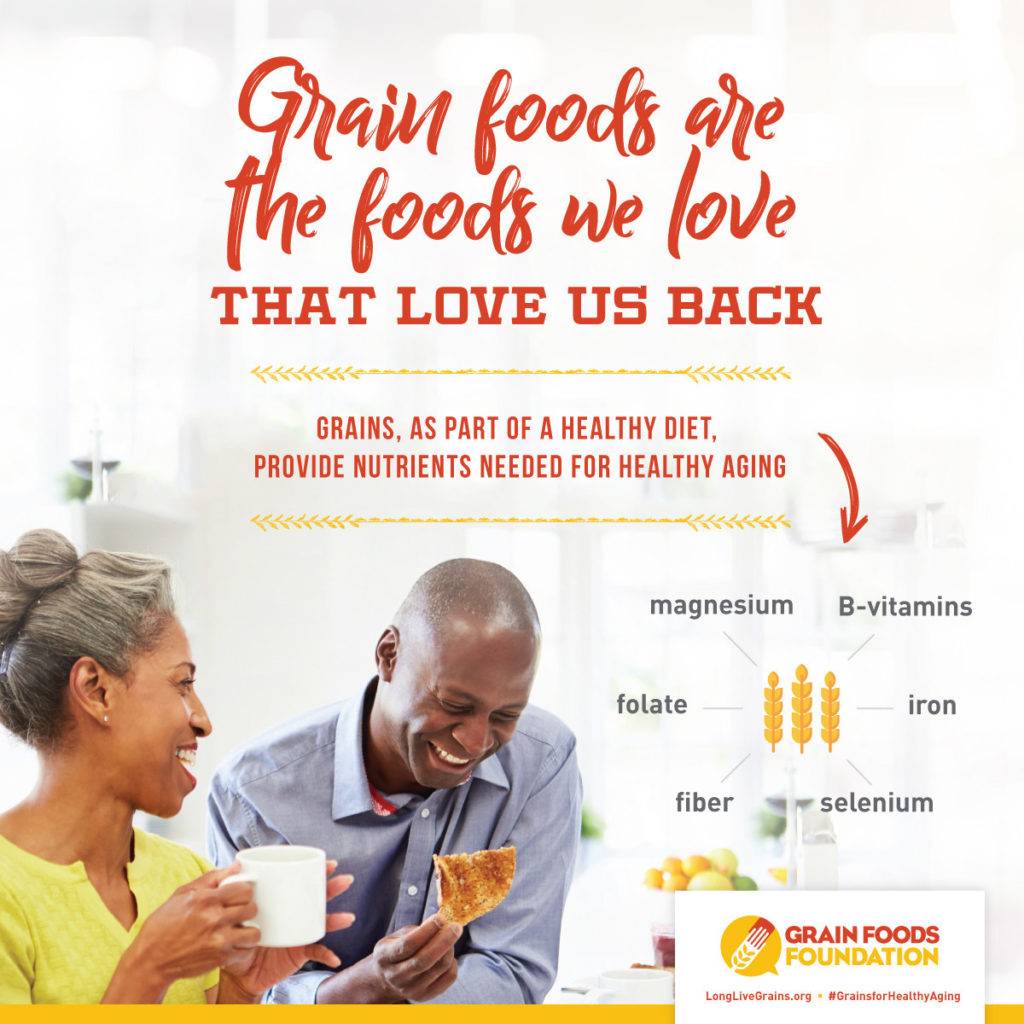New Study Shows Breads And Cereals Contribute Many Nutrients Older Americans Are Missing For Healthy Aging

A new study published this week in the journal, Nutrients, and presented at The American Geriatrics Society Annual Scientific Meeting (AGS18), shows that grain foods pack a significant punch of the nutrients older Americans need most. Presently, more than a third of the American population is over 50 years old. Yet the diets of many individuals in this population fall short in several nutrients defined by government health experts as necessary for healthy aging. The study presented at AGS18 shows that eating a variety of grain foods regularly (in addition to other nutrient-rich foods like fruits and vegetables), helps contribute to nutrient density in the total diet.
Under-consumed nutrients are called “shortfall nutrients” and include vitamins A, D, E, C, folate, calcium, magnesium, fiber, potassium and iron. Under-consumption of these nutrients has been associated with adverse health outcomes. In this study, researchers looked closely at what older American are eating – or not – to contribute to the growing issue of shortfall nutrients.
The findings show that older Americans need to think twice before cutting bread from their diets. Specifically:
- Grain foods pack more of a nutrient punch than a fat or caloric one in older Americans.
- All grain foods contributed less than five percent of total saturated fat and less than 15 percent of all calories in the total diet.
- Yet grain foods contribute a whopping amount of under-consumed shortfall nutrients and nutrients of public health concern such as dietary fiber, folate, magnesium, calcium and iron, vitamin A, vitamin E, vitamin B12, niacin, and thiamin.
- Breads, rolls and tortillas are contributors of daily need for thiamin, niacin, dietary fiber, folate, and iron. Ready-to-eat cereals contribute iron, folate, thiamin, vitamin B6, and vitamin B12.
“These data show that grain foods are the foods we love that love us back – finally, we can enjoy bread again,” said study co-author, Yanni Papanikolaou, vice president at Nutritional Strategies Inc. “The nutrient contribution of all whole and refined grain food products, including breads, rolls and tortillas and ready-to-eat cereals, can play a key role in helping older American meet recommendations for under-consumed nutrients and nutrients of public health concern.”
“We all know that The Dietary Guidelines recommend consuming half of our grains as whole grains,” Papanikolaou continued, “but enriched grains, including breads, rolls, cooked and ready-to-eat cereals also can provide meaningful contributions to the diet of all Americans. Therefore, there is no need to eliminate these from your diet. In contrast, we should simply be cautious about indulgent bakery items that may contain higher levels of ingredients consumers should limit, including added sugar, saturated fat, and sodium.”
To conduct the study, researchers reviewed more than 4,500 dietary surveys combining data from two NHANES datasets (2011–2012; 2013–2014) for adults greater than 51 years old. The NHANES is a nationally-representative, cross-sectional survey of U.S. non-institutionalized, civilian residents. NHANES data are collected by the National Center for Health Statistics of the Centers for Disease Control and Prevention.
The surveys asked people to recall what they had eaten in the past 24 hours. Data were analyzed for men and women, and looked at the consumption of all grains and various sub-categories (such as bread, rolls, tortillas, ready-to-eat cereals, cooked grains, quick breads and sweet bakery products). They also looked at the contribution of these products to vitamins, minerals, and dietary fiber. The researchers were especially interested in how grains contribute to under-consumed, or shortfall nutrients. These include fiber, folate, magnesium, calcium, and iron.
The newly published study in Nutrients can be found here: http://www.mdpi.com/2072-6643/10/5/534/htm
The American Geriatrics Society Annual Scientific Meeting is the premier educational event in geriatrics, providing the latest information on clinical care, research on aging, and innovative models of care delivery. The conference addresses the needs and emerging insights of physicians, nurses, pharmacists, physician assistants, social workers, long-term care and managed care providers, healthcare administrators, and others committed to healthy aging. For more information about AGS, please visit https://www.americangeriatrics.org/
For more information about the research findings, and to learn more about grain foods’ role in a healthful diet, please visit www.GrainFoodsFoundation.org.
About Grain Foods Foundation
Formed in 2004, Grain Foods Foundation (GFF) is a group of thought leaders and advocates for all grain foods and believes everybody needs grain food to enjoy a happy and healthy life. Committed to nutrition education programming that is firmly rooted in science, GFF is a strong advocate for our members and a resource for consumers and the media who want to learn more about the role of grains in a well-balanced eating pattern. GFF offers research-based information and resources to members, partners, influencers, policymakers and consumers through a comprehensive communications campaign, conferences, webinars, research tools, social media and more. GFF is committed to bringing fact-based information and common sense to the consumer. For more information, visit www.GrainFoodsFoundation.org.
About Nutritional Strategies
Nutritional Strategies is a scientific consulting firm that specializes in helping food and beverage companies develop and communicate science-based claims about their products and services. Nutritional Strategies also publishes evidence-based nutrition-related articles in the peer-reviewed literature every year.
SOURCE Grain Foods Foundation
RELATED LINKS
http://www.grainfoodsfoundation.org








